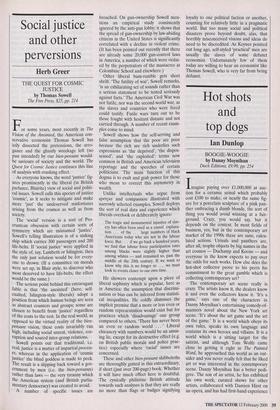Social justice and other perversions
Herb Greer
THE QUEST FOR COSMIC JUSTICE by Thomas Sowell The Free Press, $25, pp. 214 For some years, most recently in The Vision of the Anointed, the American con- servative economist Thomas Sowell has icily dissected the pretensions, the arro- gance and the ghastly wreckage left (no pun intended) by our bien-pensant would- be saviours of society and the world. The Quest for Cosmic Justice continues this line of analysis with crushing effect. As everyone knows, the word 'justice' fig- ures prominently in the liberal (in British parlance, Blairite) view of social and politi- cal issues. Sowell calls this species of justice `cosmic', as it seeks to mitigate and make more 'just' the undeserved misfortunes arising from the cosmos as well as from society. • The 'social' version is a sort of Pro- crustean obsession with certain sorts of symmetry which are misnamed 'justice'. Sowell's telling illustration is of a sinking ship which carries 300 passengers and 200 life-belts. If 'social justice' were applied in the style of, say, Lambeth or Islington, then the only just solution would be for every- one to drown. (If a committee on morals were set up, in Blair style, to discover who most deserved to have life-belts, the effect would be the same.) The serious point behind this extravagant fable is that 'the anointed' (here, self- exalted, Islington-style liberals) adopt a position from which human beings are seen as abstract counters and groups; some are chosen to benefit from 'justice' regardless of the costs to the rest. In the real world, as opposed to the virtual reality of the bien- pensant vision, these costs invariably run high, including social unrest, violence, cor- ruption and soured inter-group relations. Sowell points out that traditional, i.e. real, justice is a matter of impartial process- es, whereas in the application of 'cosmic justice' the blind goddess is made to peek. The result is a slipping back toward a gov- ernment by men (i.e. the bien-pensants) rather than laws — the very tyranny which the American system (and British parlia- mentary democracy) was created to avoid. A number of specific issues are broached. On gun-ownership Sowell men- tions an empirical study consistently ignored by the anti-gun lobby; it shows that the spread of gun-ownership by law-abiding citizens in the United States is significantly correlated with a decline in violent crime. (It has been pointed out recently that there are already some 20,000 gun-control laws in America, a number of which were violat- ed by the perpetrators of the massacres at Colombine School and elsewhere.) Other liberal bum-rumble gets short shrift. The futility of war', Sowell remarks, `is an exhilarating set of sounds rather than a serious statement to be tested seriously against facts.' The American Civil War was not futile, nor was the second world war, as the slaves and countries who were freed could testify. Futile wars turn out to be those fought with hesitant distaste and not carried through. A number of recent exam- ples come to mind.
Sowell shows how the self-serving and false assumption that the poor are poor because the rich arc rich underlies such expressions as 'the deprived', 'the dispos- sessed', and 'the exploited': terms now common in British and American television reportage and the speeches of certain politicians. The main function of this dogma is to exalt and grab power for those who mean to correct this asymmetry in wealth.
Unlike intellectuals who argue from apercus and compassion illustrated with narrowly selected examples, Sowell deploys the sort of real data and experience which liberals overlook or deliberately ignore:
The tragic and monumental injustice of slav- ery has often been used as a causal explana- tion . . . of the . large numbers of black Americans today who are not in the labour force. But . . . if we go back a hundred years, we find that labour force participation rates among blacks were slightly higher than among whites — and remained so, past the middle of the 20th century. If we want to know why this is no longer so . . . we must look to events closer to our own time.
He showers contempt upon a piece of liberal sophistry which is popular, here as in America: the assumption that discrimi- nation or bias can be inferred from statisti- cal inequalities. He coldly dismisses the implicit premise that a more or less even or random representation would exist but for practices which 'disadvantage' one group compared to others. 'There has never been an even or random world . . . ' Liberal chicanery with numbers would be an amus- ing lie, except for its destructive effect (e.g. on British public morale and police prac- tice) especially where 'racial' issues are concerned.
These and other bien-pensant shibboleths are thoroughly gutted in this extraordinary, if short (just over 200-page) book. Whether it will have much effect here is doubtful. The cynically philistine British attitude towards such analyses is that they are really no more than flags or badges signifying loyalty to one political faction or another, counting for relatively little in a pragmatic world. But too many social and political disasters prove beyond doubt, alas, that horribly misconceived visions and ideas do need to be discredited. As Keynes pointed out long ago, self-styled 'practical' men are usually the slaves of some defunct economist. Unfortunately few of them today are willing to hear an economist like Thomas Sowell, who is very far from being defunct.


































































 Previous page
Previous page